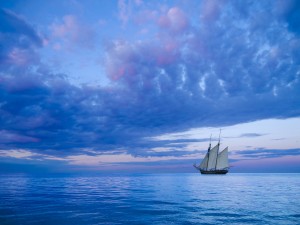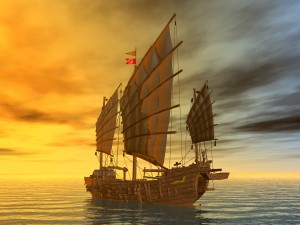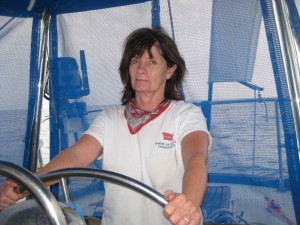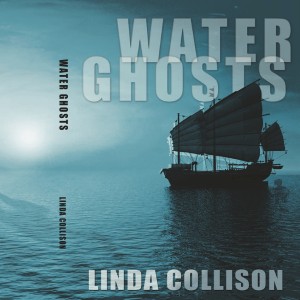
dol-drums
1. a state of inactivity or stagnation, as in business or art
2. the doldrums, a. a belt of calms and light baffling winds north of the equator between the northern and southern trade winds in the Atlantic and Pacific oceans.
3. a dull, listless, depressed mood; low spirits
Syn. depression, gloom, melancholy, dejection
— Webster’s New Universal Unabridged Dictionary
Adrift at sea, it’s not at all what I imagined.
The literal doldrums, more scientifically called the Inter-tropical Convergence Zone, is a shifting, unpredictable belt of low pressure on either side of the equator where the trade winds of the Northern and Southern Hemispheres come together. It is a pattern observed in the great bodies of water, the Pacific and Atlantic oceans, and well worth studying more, particularly if you’re a meteorologist, an oceanographer — or a sailor. Bob and I first encountered this strange, unsettled seascape when we sailed our Luders 36′, Cheoy Lee-built sailboat, from Hawaii to Tahiti, a voyage that took us twenty-one days.
Before I encountered them first hand, I imagined the doldrums to be a pleasant, placid stretch of benign water — a welcoming place, offering a respite from our relentless windward journey as we struggled to make our easting. If the winds died for a few days, I figured it would give me a chance to wash some of our sweaty, salty clothes in a bucket of fresh water on deck, and hang them on the lifelines to dry. At rest on the deep calms might give us an opportunity to slip overboard for a refreshing bathe in the tepid water– not to mention a little sunbathing on the foredeck — an activity all the glossy sailing magazines promised as part of a tropical cruise.
Since leaving Hawaii we had been beating hard into steady, strong easterlies for eight or nine days, climbing up and plunging down sparkling blue hills of water, eight to ten feet high. Sunny skies, puffy white clouds on the horizon — it was glorious sailing weather!
But there was nothing gentle about it. Beating into those seas was physically demanding. Bob and I took our turns at the helm, watch and watch, wearing our safety harnesses and strapped to the lifeline. It was at once exhilarating, yet exhausting.
Down below, cooking presented its own challenges. I strapped myself in, took a wide stance in front of the two-burner alcohol stove swinging madly on gimbals, and prepared for the juggling act that inevitably followed. Each time the boat crashed down the back side of a roller, knives and wooden spoons became airborne and supper would lift itself up out of the pot. Simply advancing the five steps from the companionway to the v-berth at the bow was a feat requiring all four extremities. Handholds were a must as I lumbered and lurched across the swaying deck. And this was good weather, I marveled! What would a storm at sea be like?
We entered the ITCZ — the doldrums — rather suddenly. One day the wind dropped and the next day it gasped its last breath and we were dead in the water, about six degrees north. But the water in that fabled place wasn’t flat like a lake, like I imagined it would be if the wind wasn’t blowing. Energy was still surging through the ocean, rocking our boat violently from side to side, but without the wind we were going nowhere — except possibly westward, on the North Equatorial Current. The sun disappeared and soggy, sullen gray clouds soon enveloped us. The sails slatted and banged with each wave of energy that passed beneath us — through us — shaking the boat and the boom, rattling our teeth and our nerves. Below — books, dishes, and anything not securely — stowed flew across the cabin, as if flung by an angry poltergeist. To keep the rigging from being damaged we sheeted the boom in to its cradle and dropped the sails, lashed the wheel and went below, wedging ourselves in the v-berth amidst the spare sails to keep from being tossed about ourselves. The seasickness we had overcome a few days into the passage, came back to haunt us. We were in our own particular hell.

This is when the idea of water ghosts crept into my imagination. The rocking and shaking felt like malevolent forces were intent on destroying us. Now that we weren’t moving, I experienced intense claustrophobia, trapped in a small boat in the middle of the ocean, many days away from the nearest island. I drugged myself with a double dose of Dramamine and tried to sleep.
There was no thought of bathing in the ocean — the boat was rocking so hard as to make getting back on board hazardous. Not to mention the fear of sharks. On the return voyage, when passing through the doldrums, something struck our rudder (a shark? a whale? floating debris?) and Bob had to go overboard, dive down and inspect it for damage. He tied a dock line around his waist, the other end to the stanchion, donned mask and fins and dropped over the side. Fortunately, the rudder was intact — but once again I struggled with a mounting panic as I stood on the bobbing deck, feeling trapped being aboard a small floating object in the midst of a vast, unpredictable ocean, going nowhere. Oh, and did I mention it was insufferably hot and humid?
Rain squalls! The one blessing the doldrums shower upon you is fresh water. Frequent yet unpredictable little downpours, complete with their own little weather patterns, which usually involved strong but short-lived winds. A chance to raise the sails and make some progress. A chance to get out the shampoo, strip down and shower on deck. We had no water maker on that passage (and water makers take power, which requires carrying more fuel which is impractical on a small sailboat). Although we carried 120 gallons of fresh water in our tanks — and several cases of bottled water — we always took advantage of fresh water from the heavens. Cruising sailors are thrifty by necessity.
Why not turn on the engine and motor out of the doldrums, you might wonder? Being a small sailing vessel, we carried a limited amount of diesel fuel and could not afford to waste it, just to make way. Like sailors of centuries past, we had to be patient and wait for the wind. Before the advent of steam, sailing ships driven around the world by the powerful trades were often “caught” in the doldrums for days or weeks on end, until they drifted north or south enough to pick up the reliable trades again — or the invisible zone’s ever-changing boundaries shifted and steady breezes graced them once again.
“What was that?” I murmured to Bob, coming out of my drug-induced sleep. The boat wasn’t shaking so much. There was a soughing sound in the rigging as if the ocean was breathing again, in fits, starts, and listless sighs.
“Wind,” he said.
We pulled ourselves out of our steaming hot bunks, staggered up on deck to roll out the jib, only to be disappointed. But we kept at it, each huff, each luff, we ghosted along the confused waters as far as that breath would take us. By nightfall the breeze was steady enough to raise the mainsail and we were back on course, making two or three knots. The skies cleared and new stars appeared to guide us on our journey south, toward landfall.

That brings me to the other connotations of the word doldrums: A period of inactivity or stagnation in business or art. a dull, listless, depressed mood; low spirits.
Writers — know that encountering the doldrums is part of the creative process, part of the process of living. If you find yourself stuck, uninspired, depressed, or afraid, don’t abandon ship. Instead, examine the deep waters beneath you, supporting you, surrounding you. Explore the deep dark waters of your subconscious mind. Feel the greater Energy that breathes Life into your valiant body, still afloat, and somewhere aboard that floating home, your Soul. Sit down and write what surfaces. Write your way through these difficult, sometimes terrifying times.

Water Ghosts is now an audio book, narrated by Aaron Landon and produced by Dennis Kao, from Audible.com.